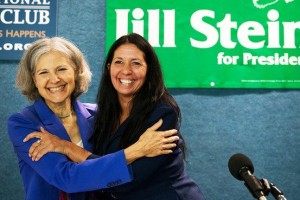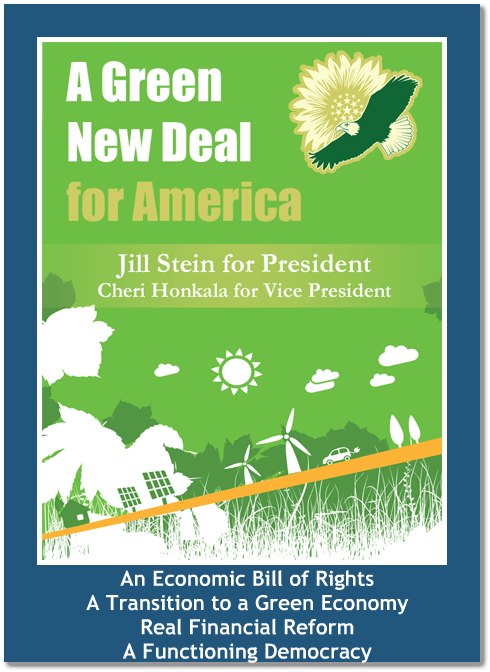The Green New Deal

For the first time in its history the Green Party has received matching public funds for the presidential election from the government, and they are on most of the state ballots. Though the media is only focused on the two big parties (the Democrats and Republicans), the people need to be aware that there are more than just two parties. The focus of the party is called the Green New Deal, which is a four-part plan to reshape our economy, put Americans back to work, and change Washington. When reading through it, it all basically sounds fairly simple and straight-forward. And several parts of it are things that most Americans have been calling for the last four years, and the Democrats and Republicans have only been giving 'lip-service' to.
A big focus of the Green New Deal is a focus on the transition to green energy and away from fossil fuels. This would be done by investing in green businesses, prioritizing green research, and it would provide jobs. Providing jobs is key in our current economic climate. A big deal was made when President Obama thwarted Congress on the Keystone Pipeline, but jobs in green energy are just as good as that and could possibly be even more long-term than the pipeline would have been. So let me raise this question... big oil is technically big energy as they do invest in renewable energy sources, so wouldn't they still get the tax breaks if they are given to green energy companies? But placing more focus on green energy would surely provide a major boost to our economy. As the plan says, it's a transition so that little by little we start moving in that direction. There would still be a need for oil production, as the less we use, the more we'd be able to export to other nations that have not replaced their focus on energy yet. It could easily be a win-win during this transition phase.
 "The takeover of our economy by big banks and well-connected financiers has destablished both our democracy and our economy." It's no secret that Wall Street has invaded our political process. They basically set the rules for the game in their own favor, and when things went bad, they had us bail them out. Now, I am on to say that if every major bank had collapsed, we could have easily gone into a depression. But that still doesn't mean that we will continuously bail out these big banks. The plan calls for the breakup of the "too big to fail" banks, but I wonder if they'd be able to compete in a global economy as we have now. The restoration of Glass-Steagall is something that Washington should be listening to. It is time to reapply the separation of commercial banks and investment banks. The plan does go further in the dissolution of "private bank-dominated Federal Reserve Banks and place them under a Monetary Authority within the Treasury Department." But wouldn't this still bring about the same problems we face with The Fed? The problem isn't necessarily The Fed itself as it the fact that it has no oversight and no transparency. It does need to stay out of the political arena, but that doesn't mean that it shouldn't be held accountable, and that we the people still have a right to know what's going on within it. "Under the Green New Deal we will start building a financial system that is open, honest, stable, and serves the real economy rather than the phony economy of high finance."
"The takeover of our economy by big banks and well-connected financiers has destablished both our democracy and our economy." It's no secret that Wall Street has invaded our political process. They basically set the rules for the game in their own favor, and when things went bad, they had us bail them out. Now, I am on to say that if every major bank had collapsed, we could have easily gone into a depression. But that still doesn't mean that we will continuously bail out these big banks. The plan calls for the breakup of the "too big to fail" banks, but I wonder if they'd be able to compete in a global economy as we have now. The restoration of Glass-Steagall is something that Washington should be listening to. It is time to reapply the separation of commercial banks and investment banks. The plan does go further in the dissolution of "private bank-dominated Federal Reserve Banks and place them under a Monetary Authority within the Treasury Department." But wouldn't this still bring about the same problems we face with The Fed? The problem isn't necessarily The Fed itself as it the fact that it has no oversight and no transparency. It does need to stay out of the political arena, but that doesn't mean that it shouldn't be held accountable, and that we the people still have a right to know what's going on within it. "Under the Green New Deal we will start building a financial system that is open, honest, stable, and serves the real economy rather than the phony economy of high finance."
To go along with financial reform would be an economic bill of rights. The plan calls for the right to employment through a Full Employment program... that would be run locally. It calls for replacing the minimum wage with a living wage. This could be easily tied to inflation and/or the cost of living. They call for the right to decent affordable housing which includes an immediate halt to foreclosures and evictions as well as the right to accessible and affordable utilities that operate at-cost. Now most of our utilities are public utilities, but they also want to add in phone and internet. Since most of us now only have cell phones, would this mean taking over (or nationalizing) the cell phone companies? Wouldn't more choices be a better option and let the free market actually work? And what determines at-cost? Things will need repaired, there will be new equipment, and even new upgrades as time moves on. How are those planned? Another point is that tuition is skyrocketing for college students, and they are graduating under a burden of a major debt. The Green Party calls for tuition-free public education from pre-school to college. But they don't explain how they would get the money from this if it is federally funded. Education is the basis of any thriving society, and we should have a focus on improving it, but I'm not quite sure college can be completely tuition-free. And what about private school and even charter schools? Where do they fit into this plan? And since this would be all be funded through our tax dollars, this brings to another part which is "the right to fair taxation that's distributed in proportion to the ability to pay." The progressive scale of taxation can work if it coincides with one's ability to pay. Those that make more pay a bit more in taxes than those that make less than them, and I'm referring to percentages and not dollar amounts.
 "Just as we are replacing the old economy with a new one, we need a new politics to restore the promise of American democracy." The first item on their list is the repeal of Citizens United by a Constitutional Amendment to make it clear that people are people, and businesses are businesses. All qualified candidates would be guaranteed equal access to the ballot. Voters would at least know they have more than two choices, the question would become what would those qualifications be? Would it be matching funds... and if so, what would the threshold be for that? Would it be access to 270-Electoral votes? This last question doesn't even matter since they call for the abolition of the Electoral College and for the direct election of the President/Vice-President. The Electoral College has left our nation deeply divided and the focus of each election falls only on the states that swing back and forth; therefore, leaving the majority of the people left out. In the past several years, we've started seeing more public-private partnerships when it comes to certain projects. They call for publicity, training, education, and direct financing for future cooperative development. This gives businesses a stake in their local economies and doesn't have the taxpayer paying the entire bill for a project. This could help reduce budgets both federally and for the states... and could place people back to work in the private sector. And if we are going to talk about restoring our democracy, then laws that violate the Constitution should be automatically repealed. This even includes the Patriot Act. Since 2001, we have seen several laws being passed that clearly violate the laws our Constitution set forth. To control our budget, we need to cut military spending... which the Green New Deal calls for a 50% cut and closing of military bases around the world. Do they mean all or just some of those bases? As the leader of the free world, shouldn't we have some stationed strategically around the world?
"Just as we are replacing the old economy with a new one, we need a new politics to restore the promise of American democracy." The first item on their list is the repeal of Citizens United by a Constitutional Amendment to make it clear that people are people, and businesses are businesses. All qualified candidates would be guaranteed equal access to the ballot. Voters would at least know they have more than two choices, the question would become what would those qualifications be? Would it be matching funds... and if so, what would the threshold be for that? Would it be access to 270-Electoral votes? This last question doesn't even matter since they call for the abolition of the Electoral College and for the direct election of the President/Vice-President. The Electoral College has left our nation deeply divided and the focus of each election falls only on the states that swing back and forth; therefore, leaving the majority of the people left out. In the past several years, we've started seeing more public-private partnerships when it comes to certain projects. They call for publicity, training, education, and direct financing for future cooperative development. This gives businesses a stake in their local economies and doesn't have the taxpayer paying the entire bill for a project. This could help reduce budgets both federally and for the states... and could place people back to work in the private sector. And if we are going to talk about restoring our democracy, then laws that violate the Constitution should be automatically repealed. This even includes the Patriot Act. Since 2001, we have seen several laws being passed that clearly violate the laws our Constitution set forth. To control our budget, we need to cut military spending... which the Green New Deal calls for a 50% cut and closing of military bases around the world. Do they mean all or just some of those bases? As the leader of the free world, shouldn't we have some stationed strategically around the world?
My overall goal for this piece wasn't to convince you to vote for the Green Party. It was to introduce you to them and their overall plan. I didn't discuss every bit of the Green New Deal... just a few points of it. I recommend reviewing the plan for yourself for more details. (click here) It's an easy and quick read. Your vote is still your decision, but at least you have become a more educated voter in the process and that there are more than just the two options.
SIDENOTE:
All quotes, unless otherwise stated, are from "A Green New Deal For America."


